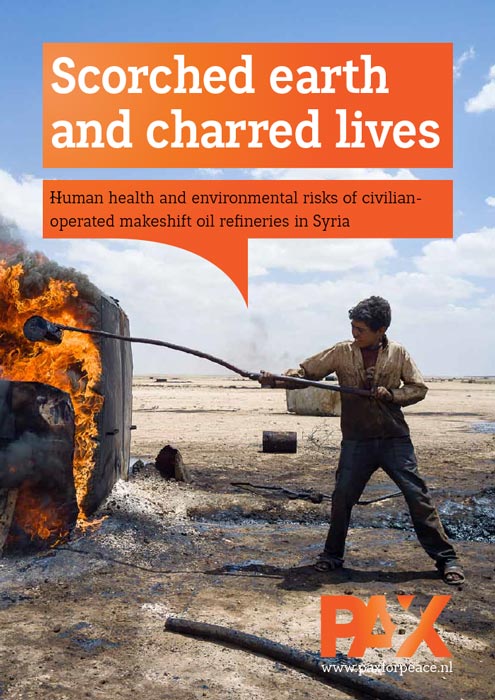Thousands of children work in deplorable conditions in makeshift oil refineries in Syria. These amateur refineries have sprung up due to the drastic decline in production by professional oil refineries in Syria. The conditions at these sites is causing enormous health and pollution problems in the region.
The PAX report Scorched Earth and Charred Lives documents the sharp increase of these refineries and the extent of the problems associated with them.
“The images I looked at in doing this study are horrible,” says report author Wim Zwijnenburg, researcher for PAX. “Children covered by second and third-degree burns, with oil still in the wounds. People covered from head to toe by a layer of black residue.”
More than ten thousand refineries
PAX has identified 36 such fields of makeshift refineries throughout Syria for this report. At these fields, ordinary Syrians are refining crude oil into benzene, kerosene or diesel. Analysis of the satellite images of five selected fields in the vicinity of Deir ez-Zor in eastern Syria shows that since 2012, nearly 5,800 makeshift refineries have been constructed. The total number of Syrians, including many children, working at such sites around the country may be in the tens of thousands. Health risks arising from amateur refineries include exploding oil drums, burns, and exposure to poison fumes and chemicals. The population will be faced with contaminated ground water and agricultural land for years to come.
“Due to bombardments and lack of staff who fled or left the country, professional refineries have drastically cut back their production,” explains Zwijnenburg. “At the same time, the demand for fuel for daily life remains high. Armed groups including the Islamic State encourage the makeshift refining because the groups earn money by selling the raw oil to the amateur refineries, and then taxing the fuel they produce.”
International assistance needed
PAX is calling for large scale, definitive identification of all makeshift oil production fields in Syria. PAX also calls for the documentation of the potential consequences of makeshift oil refineries. This would help in the protection of civilians during and after the conflict through quick and effective health assistance as soon as is becomes safe to do so. “When the moment comes that it’s safe to do so, the international community should be ready to offer help,” says Zwijnenburg.
Scorched earth and charred lives is a follow-up to the PAX publication Amidst the debris (2015) which identified a range of potential hazards caused by the conflict that endanger public health and the environment, both in the short term and for many years to come.
See Scorched earth and charred lives




